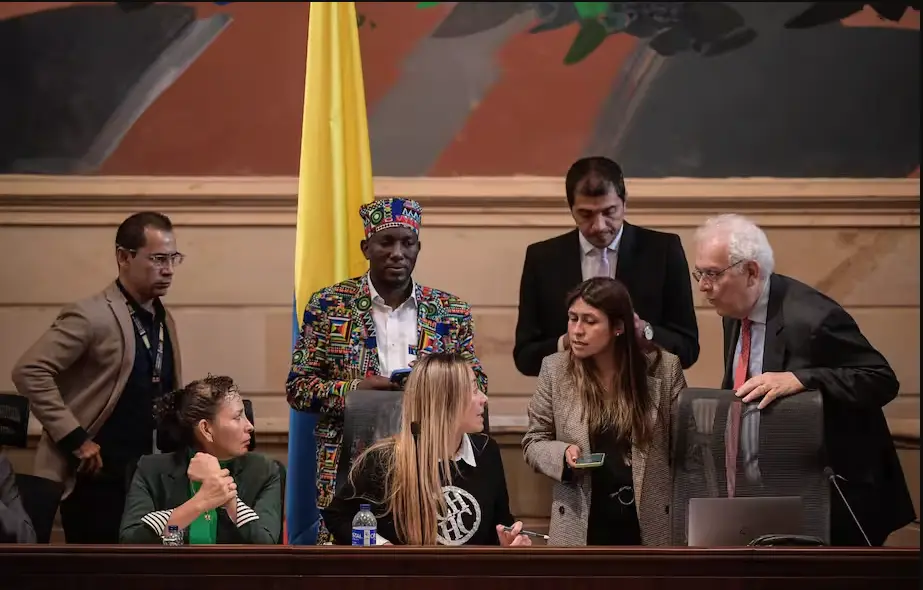The Colombian state experienced a significant shift following the 2022 presidential elections, which brought Gustavo Petro to power. A former militant of the now-defunct M-19 guerrilla group assumed the responsibility of leading the major transformations proposed during his campaign.
A different approach to governing Colombia
In Colombia’s political history, no president had been explicitly aligned with the political left, nor had there been an Afro-descendant vice president. This unprecedented scenario opened the door to a more inclusive political framework, moving away from traditional elite governance toward a broader, more pluralistic, and deeply diverse participation.
Within this context, the national government embarked on an unusual process of constructing the National Development Plan (PND), inviting all sectors of society to participate through so-called Binding Regional Dialogues. This social interaction exercise allowed the administration to better understand the country’s comprehensive needs.
Once the PND was drafted, the government formalized its agenda and outlined what some administration sectors promote as the policy of “Total Peace”. The document defines it as “a commitment to placing a dignified life at the center of all public policy decisions, ensuring that both humans and ecosystems are respected and protected.”
Implementation of the PND
The Total Peace Law, or Law 2272 of 2022, incorporates several socially impactful reforms aimed at achieving five major transformations: the human right to food security, land management focused on water resources, human security, a life-centered productive economy, climate change mitigation, and regional convergence.
The ambitious program has already achieved notable successes, highlighted by the Organization for Economic Cooperation and Development (OECD) in a recent report. Key reforms include an initial tax reform (2022) and a pension reform designed to increase coverage and support for older adults who, for various reasons, did not qualify for a pension.
However, implementing the PND has faced numerous obstacles. Other critical reforms have stalled in Congress due to a lack of consensus and political inexperience among government-aligned parties. Additionally, challenges persist in crafting a foreign policy strategy that complements domestic political objectives, particularly in internationalizing the agenda.
Foreign policy within the PND
After 27 months, despite the PND’s declaration that Colombia would adopt a feminist foreign policy, official guidelines or directives remain absent. Some initiatives, such as the Africa Strategy or the country’s leadership on environmental issues—underscored during its hosting of the COP16 biodiversity summit—have emerged from ministries other than the Foreign Ministry.
Even though Colombia led the March 14, 2024 meeting during the 68th session of the Commission on the Status of Women (CSW), where prominent Foreign Ministry officials represented the country, this does not equate to a clearly defined foreign policy. To date, only a draft document uploaded to the National Planning Department’s platform provides insight, but no official foreign policy has been established.
Progress and setbacks
Despite this, some progress has been made. For instance, within the framework of multilateralism, Colombia has advocated for external debt relief in exchange for environmental protection measures.
Another noteworthy achievement is the restoration of bilateral dialogue with Venezuela. While the government has been criticized for failing to denounce the apparent electoral fraud of July 28, 2024, the reestablishment of relations with Venezuela stands out as one of the administration’s significant successes. In 2023, trade between the two countries exceeded $800 million, and projections for this year suggest figures surpassing $1 billion, according to Colombia’s National Foreign Trade Association (Analdex).
Moreover, the government has emphasized the need for multilateral efforts to tackle drug-related issues differently. However, Colombia faces the ongoing challenge of extensive coca cultivation, which reached a record 253,000 hectares, according to the latest UN Office on Drugs and Crime report. These figures undermine the credibility of Colombia’s internal efforts to address the problem, complicating its ability to influence multilateral forums.
Other topics, such as war, regional integration, and gender leadership, have been part of the country’s international agenda—war is a suitable issue for conveying messages related to Total Peace, Petro’s main political program. However, more than two years into his presidency, Gustavo Petro continues to face difficulties in internationalizing his flagship program.
Unless concerted efforts are made to secure the support of key actors within the international system, the administration’s domestic policy objectives will remain out of reach. Official declarations and formal alliances are essential for achieving proposed goals. So far, the government has fallen short, leaving Colombia without a coherent foreign policy strategy.
*Machine translation proofread by Ricardo Aceves.













